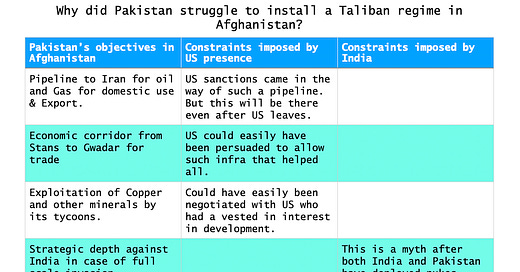What is Pakistan's key strategic objective in Afghanistan?
Why did Pakistan struggle so hard to install a Taliban regime in Afghanistan at such a horrendous cost to itself, US, and Afghanistan?
Reams and reams are being written on Afghanistan by all sorts of experts. But having plowed through a lot of them, I did not find any that answer the simple question that I had in mind, viz,:
Why did Pakistan struggle so hard to install a Taliban regime in Afghanistan, at such a horrendous cost to itself, US, and Afghanistan? What was the one objective that Pakistan could not have achieved, if the US continued its token presence of 2000 odd troops to support a national Government in Afghanistan?
So as usual, I created a table, and in the matrix, plugged in all the variables that could have weighed with Pakistan’s strategic masters in deciding to continue to wage a proxy war against the world’s sole superpower for over 20 years. Mind you, one doesn’t do such a thing lightly. So there must have been a lot at stake in the decision.
The table is reproduced below from my spreadsheet since substack’s capacities are very rudimentary:
Pakistan’s Army Chief has declared many times that Pakistan strategy now is driven by trade, commerce, and Geo-Economics, implying thereby that Pakistan will henceforth give primacy to economic interest in its strategy and policy. As with all politicians, you may hear them, but to understand their real intentions, you have to watch what they do. With this percept in mind, go through the the above table, one objective at a time.
How would the US presence under a national government of all stakeholders prevent Pakistan from achieving any of its stated economic objectives? It could have had its pipelines to Central Asia, barring Iran [which is under sanctions, and will continue to be so]. It could have negotiated for its tycoons to participate in mining or any other business in Afghanistan. The US and Afghans would be happy to oblige, subject only to normal commercial consideration. Indian influence in Afghanistan is much hyped about in India. India’s track record in the neighborhood shows how little India counts for when push comes to shove.
On the other hand, with the USAID program in full swing, both Pakistan and Afghanistan could have transformed their economies. In fact Afghanistan’s $20 billion economy grew by an order of magnitude more after 1990, from virtually $2 billion, to $20 billion, with the help of US reconstruction. 50% of Afghanistan was electrified, metal roads connect all cities, and 70 out of every 100 Afghans have a cell phone, a ratio we still lack in India. So there was nothing in the sphere of “geoeconomics,” that Pakistan Army Chief swears by, that Pakistan could not have achieved by collaborating with the US, instead of fighting them through Taliban proxies.
There have been many allegations in the Pakistani press, that India used its presence in Afghanistan, to foment trouble among the Pashtuns across the Durand Line. I have no read on this subject. But elimination of such a capacity against Pakistan would be a legitimate objective for Pakistan, and had it not been at war with the US through its proxies, Pakistan could have asked for cessation of all such activity, and I don’t see why any Afghan Govt., or the US, would not have obliged Pakistan. Both had nothing to gain from such Indian activity, if at all it was allowed to take place.
Given all this, why would Pakistan wage a 20 year struggle to install its proxies in Afghanistan?
The one and only reason is to preserve Pakistan’s capacity for intervention in Kashmir and elsewhere in India. Any escalation of intervention in Kashmir would certainly have India looking at its options for intervention via the Pashtuns across the Durand line. This tit-for-tat would produce a stalemate for both parties, blunting Pakistan’s offensive capabilities that it has been long used to with India. Of all the objectives that I have examined in the table, that could think of, this is the only one that cannot be achieved, without having a Govt. in Afghanistan that Pakistan controls, and also one that is implacably opposed to India on doctrinaire and ideological grounds.
Was the price to the Afghan people, US, and Pakistan itself worth the objective? Surely Pakistan didn’t go through all this struggle just for a lark?
So be warned. Pakistan’s could have waged such a 20 year proxy war with the world’s only superpower for one and only one thing - to preserve its offensive capacity for intervention in Kashmir and elsewhere.
Having achieved that objective, why would Pakistan then not use the capacity in the coming weeks, and months, to further its perceived interests on the Eastern front? An added advantage is that the said offensive capacities can now be housed across the border with Afghanistan, adding an additional layer of plausible deniability.




From perspective of Pakistan, it would have been to include few questions from Pakistan NSA
Making space in Afghanistan to hide terror training activities to undermine India is probably the most plausible explanation. The Pakistani's have played a long game with insurgencies and have an institutional expertise that is incomparable. Another reason I believe is loss aversion. It's the one strategy that they believed worked for them pre 9/11 and they are loathe to give it up. Many Pakistani generals and spies got fabulously wealthy managing/fomenting the Afghan crisis and they are not about to give that up. Of interest will be heroin shipments from Afghanistan from now on with a Pak backed Taliban ruling construct.